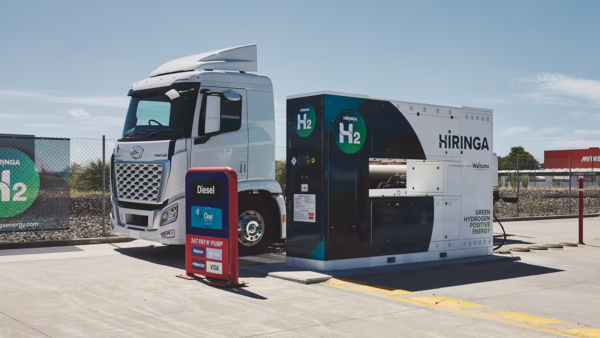Committee opportunity for experts needed to help shape our transition to hydrogen
Do you work with gas infrastructure or cylinders or active with hydrogen? New Zealand’s transition to hydrogen use relies on experts like you helping on a standards development committee to review and advise on the adoption of international standards that will help pave the way forward.

Hiringa refuelling station
Part of the hydrogen work programme
The Ministry for Business Innovation and Employment (MBIE) has had a hydrogen work programme for a number of years and produced a ‘Vision for Hydrogen in New Zealand’ green paper which was the first government-initiated conversation on hydrogen as part of New Zealand’s clean energy transition. In conjunction with this, Standards New Zealand has been leading a multi-year standards development strategy to adopt hydrogen-specific equipment safety standards, designed to underpin H2 infrastructure and the supply chain.
The first tranche of 13 international standards were successfully adopted earlier this year, as well as revision of NZS 5442:2008 – Specification for reticulated natural gas as an ‘interim standard’ to enable blending of biomethane into the reticulated gas network. MBIE has also been focusing on a targeted regulatory approach to allow these new standards to be flexibly recognised, as means of meeting regulatory obligations (where appropriate). Legislation is currently going through New Zealand’s parliament, which will make our energy regulations much nimbler and more adaptive to changing technology standards, over time.
We need your help
Meanwhile, the next phase is getting underway for the modified adoption of a further 10 international standards (see below), and phase two of the revision of NZS 5442, to enable additional blending of hydrogen into the reticulated natural gas network. To that end, we are seeking additional voluntary subject-matter-experts, to participate on two committees undertaking this important work, which is integral to New Zealand’s energy transition.
In the first instance, If you have ME-002 Gas Cylinders joint committee representation experience, or natural gas infrastructure knowledge, HT dual refuelling and or fuel-cell experience, H2 production and handing experience, or CGH2 and LH2 handling, storage, transportation, and or refuelling experience then we need to hear from you. This next phase of work will affectively complete the suite of initial H2 related equipment standards, necessary for safe production and refuelling.
Get in touch
As a voluntary participant on our standards committees, you will be contributing to the greatest energy transition this country has experienced in over 150 years. To find out how you can participate (or nominate one of your colleagues), email chris.forsman@mbie.govt.nz and together, let’s get this country moving! Nominations close Friday 4 October.
International standards – modified adoptions
Standards that underpin H2 production
- ISO 16110-1:2007 Hydrogen generators using fuel processing technologies – Part 1: Safety
- ISO 16110-2:2010 Hydrogen generators using fuel processing technologies – Part 2: Test methods for performance
- ISO 22734:2019 Hydrogen generators using water electrolysis – Industrial, commercial, and residential applications. Expected to be replaced by ISO/DIS 22734-1 within the coming months.
- ISO TS 19883:2017 Safety of pressure swing adsorption systems for hydrogen separation and purification
Standards that underpin H2 refuelling stations and critical safety requirements
- ISO 19880-1:2020 Gaseous hydrogen – Fuelling stations – Part 1: General requirements.
- IEC 62282-2-100:2020 Fuel cell technologies - Part 2-100: Fuel cell modules – Safety
- IEC 62282-3-100:2019 (RLV) Fuel cell technologies - Part 3-100: Stationary fuel cell power systems – Safety
- IEC 62282-3-200:2015 Fuel cell technologies – Part 3-200: Stationary fuel cell power systems – Performance test methods
- IEC 62282-3-201:2017+AMD1:2022 CSV Fuel cell technologies – Part 3-201: Stationary fuel cell power systems – Performance test methods for small fuel cell power systems
- IEC 62282-3-300:2012 Fuel cell technologies – Part 3-300: Stationary fuel cell power systems – Installation
